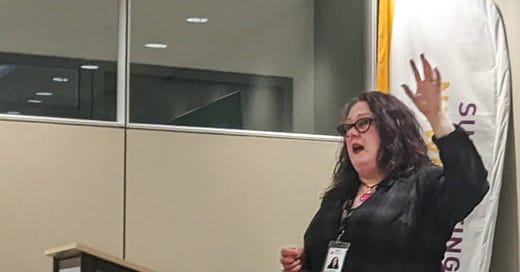Newcomer Centre launches Cultural Advantage program
Employers can now learn and overcome barriers related to newcomer hires
In February, the Edmonton Newcomer Centre invited people from various industries to the launch of its Cultural Advantage program. This program is a social enterprise developed by the centre to help employers better understand barriers that may complicate their understanding of newcomer hires.
The meeting was hosted at their Wîhkwêntôwin (formerly Oliver) location (10170 112 St) by program director Anne Hayes and acting director Laurie Hauer, who outlined the program's goals and history. The audience comprised mostly non-profit social organization representatives who intend to aggregate the information to employers in their networks.
For over 40 years, the non-profit organization (previously called the Edmonton Mennonite Centre for Newcomers) has been helping support immigrants and refugees coming to Edmonton and the surrounding area. They work with up to 17,000 newcomers from all parts of the world each year, with 230 staff in various locations who collectively provide services in more than 50 languages. The majority of the responsibility for integration has traditionally fallen on the shoulders of the newcomers, but the centre's staff realized that employers themselves would benefit by learning communication skills that let them function effectively across cultures. This skill-building process is referred to as intercultural competency.
“Canada is a multicultural country. Unless you are part of an indigenous population here in Canada, you are either an immigrant or you are a child or descendant of immigrants and I think sometimes it's easy for us to forget that,” said Julie McCrea, manager of the Cultural Advantage project. “The immigrant experience IS the Canadian experience. And as Laurie, our executive director said it really well ‘When one of us succeeds, we all succeed.”
Employers had already been approaching the agency for informal corporate training, webinars, and focus groups, demonstrating a clear need for a formalized program. The key challenge was demonstrating value to secure donor dollars and grant funding via the Settlement Integration and Language Project’s (SILP) Alberta program. Funding for the social enterprise came together in 2024 and the Cultural Advantage program was formalized. Its goal is to provide intercultural competency through self paced online courses, short videos, and specialized workshops for employers and their staff.

McCrea, who is also the Adult Learning and Special Projects lead at the agency, spoke in more detail about the program. Her e-learning assistant, Hiranyaa Sahadevan, showcased examples of microlearning videos, each under five minutes, that provide easily digestible education on intercultural competencies and challenges. This is in addition to deeper, self-paced e-learning courses for employers. Modules include navigating differences in communication, cultural norms, writing job ads for diversity, and more.
One video example available on their YouTube channel, @CulturalAdvantage, demonstrated how a question about whether it was appropriate to "get high" at work could be misinterpreted by a newcomer candidate. The candidate thought it meant showing positive enthusiasm for the role rather than being under the influence of drugs. This misunderstanding illustrates the confusion that can arise due to cultural differences in communication. Another example showed how some newcomers did not know they could not leave at the end of their shift without being informed directly by the supervisor, which is what they may have been accustomed to in their previous situations.

McCrea pointed out the advantage to the online approach: "It's not always viable for an organization to pay to have just one person come in and do a big workshop because they've got staff to manage and operations to maintain. But the self-led programs and the microlearnings are there for everyone anytime." She elaborated that these easily available resources are meant not only for employers but also for employees who work directly with multicultural hires. They support teamwork and leadership roles to further employee retention and improve company culture as a whole. The centre wants to provide options for everyone in an organization, recognizing that even frontline workers can eventually transition to management positions. Miscommunications can happen at any level within a company where there are interactions between people; the benefits extend beyond management.
Beyond the self-paced courses, the Edmonton Newcomer Centre aims to deliver specialized training through Lunch-and-Learn sessions, webinars, and onsite workshops. They have already begun offering these workshops and will conduct two training sessions for community league members through the Edmonton Federation of Community Leagues (EFCL) in March. Going forward, the centre will continue developing its online education as well as creating printable infographics for job sites and implementing outreach strategies through LinkedIn and direct approaches to large entities like unions.
Grant and donor funding is an ongoing and inconsistent process, so the end goal is to transition the program toward funding as a social enterprise, where employers directly compensate for the value of the programs developed. "This way, they can not only benefit from the multicultural workforce here in Alberta, but they can also better serve the growing number of potential newcomer clients,” says McCrea. “The outcome we are working towards is a more welcoming work environment for newcomers, and a more content and productive workforce for employers."
The vision for the program extends beyond Edmonton, with hopes to eventually share their findings and programs across Canada. As one of the most established and experienced newcomer centers in the country, the Edmonton Newcomer Centre is well-positioned to lead this important work in creating more inclusive workplaces nationwide.
For more information please contact:
jmccrea@newcomercentre.com or culturaladvantage@newcomercentre.com
Or visit the website: newcomercentre.com/program/cultural-advantage/
Sherridon Routley is a friend of the community who enjoys urban exploring every corner of the city by bicycle. Although he had previously owned a house south of the RCP district and understands the challenges of the area, he now resides in East Glenora.






It is heartwarming to read this article. I wish all newcomers the very best in our wonderful country of Canada.